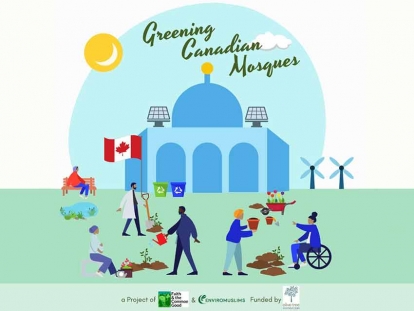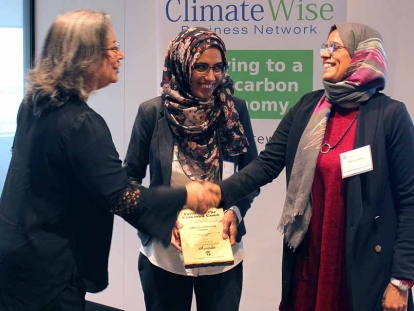
Oct
Greening Canadian Mosques Launches Phase 3: Climate Conversations
Written by Faith and the Common GoodWe are delighted to announce that our Greening Canadian Mosques (GCM) program in partnership with EnviroMuslims has received new funding from Olive Tree Foundation.
Launched in 2020, GCM empowers mosque management teams, as well as mosque-goers, with the tools they need to understand environmental issues and take appropriate action.
Greening Canadian Mosques: Climate Conversations is phase three of the GCM program.
It will build upon the communications package and toolkit developed in the previous phase of the project specifically for Canadian mosques to help guide them in improving sustainable practices, reducing carbon emissions, and reducing costs.
“The first program of its kind in Canada, Climate Conversations will continue engaging a broad range of community partners and stakeholders that include both Imams and management teams, as well as youth leaders from Canadian universities and colleges who will share inspiration and best practices,” says Michelle Singh, FCG’s Executive Director.
“Climate Conversations will not only give Imams an opportunity to participate in peer-to-peer learning sessions and trainings, it will offer a platform to a generation of diverse Muslim youth to share their concerns but also, solutions to challenges their local mosques are facing when it comes to implementing sustainability programs and engaging with their local communities,” says Saba Khan, Co-Founder and Director of Community Outreach at EnviroMuslims.
Ten GCM Community Ambassadors (Muslim Canadians) from across the country will be selected through an online hiring process and trained to recruit mosques in their provinces to sign up for the program. They will help facilitate webinars for Muslim leaders and community members that align with the content of the toolkit, as well as encourage participation in workshops and trainings related to taking climate action and learning about environmental sustainability.
Starting in January 2022, Climate Conversations will offer a monthly webinar series. January’s webinar entitled, Success Stories from Canadian Mosques, will highlight case studies that were featured in the Greening Canadian Mosques toolkit, including the Jaffari Centre (waste management), ISNA Canada (sustainable Ramadan), and Masumeen Community Centre (community gardens). Imams will discuss best practices and challenges they face when engaging with their local communities around taking climate action.
February’s webinar is called Youth Leaders: Championing Sustainability in Canadian Communities. This webinar is designed to bring together youth leaders (post-secondary students across Canada), specifically in Muslim Student Associations in colleges and universities. Youth will be challenged to work on developing sustainability projects and solutions for their local mosques that will be compiled into a document which will be sent to Imams across the country.
Our final webinar in March is Greening Your Mosque. This session will feature training led by Bahu Trust (UK-based) and will also include a workshop component highlighting Faith & the Common Good’s Energy Benchmarking program. Imams will hear from the top three solutions that were provided by Canadian youth on how to green Canadian mosques.
To accommodate mosques with French-speaking congregation members, a new translation of the materials created for the Greening Canadian Mosques program will be made available to be downloaded in French.
Muslims want to do their part for the climate
There are over one million Muslims in Canada and over 900 mosques.
In a recent survey conducted by EnviroMuslims, 98.5% of Canadian Muslims surveyed indicated they agreed that mosques have an important role to play in inspiring the Muslim community to care for nature. In addition to this, 98.5% indicated that they would like their local mosque to join a program that helps them to become more environmentally friendly by using resources efficiently and reducing costs.
These statistics demonstrate that Canadian Muslims are not only interested in taking climate action themselves, but also see their mosques, Imams, and community leaders as being responsible for championing change within their communities.
Climate Conversations begins in October, and will end in April, 2022 following an Earth Day event that will invite participating Imams and Muslim leaders to share inspirational messages and reflections that will be broadcasted across our various social media platforms.
We are grateful to the Olive Tree Foundation for funding this much needed initiative.
To get involved, please contact: Saba Khan at This email address is being protected from spambots. You need JavaScript enabled to view it..
EnviroMuslims is a community group dedicated to educating, engaging with, and empowering the Canadian Muslim community to embed sustainability in their everyday lives.
Faith & the Common Good (FCG) is a national, interfaith charitable network dedicated to assisting and inspiring religious congregations and spiritual groups of all backgrounds to take collective action in creating more sustainable communities.
The Olive Tree Foundation is a philanthropic foundation that promotes community development through the collection of endowed funds and charitable contributions to fund services for the long-term benefit of the community.


